Previously on Drokk!: Last time out, we took a break from the regular grind to read some Strontium Dog, under the basis that it’s created by Dredd’s John Wagner, Alan Grant, and Carlos Ezquerra, as well as simply wanting a nice holiday episode. Now, though, we return to Mega-City One and the antics of one Judge Joseph Dredd, esq. Sure hope it’s going to be a fun, easy volume we’re dealing with this time out!
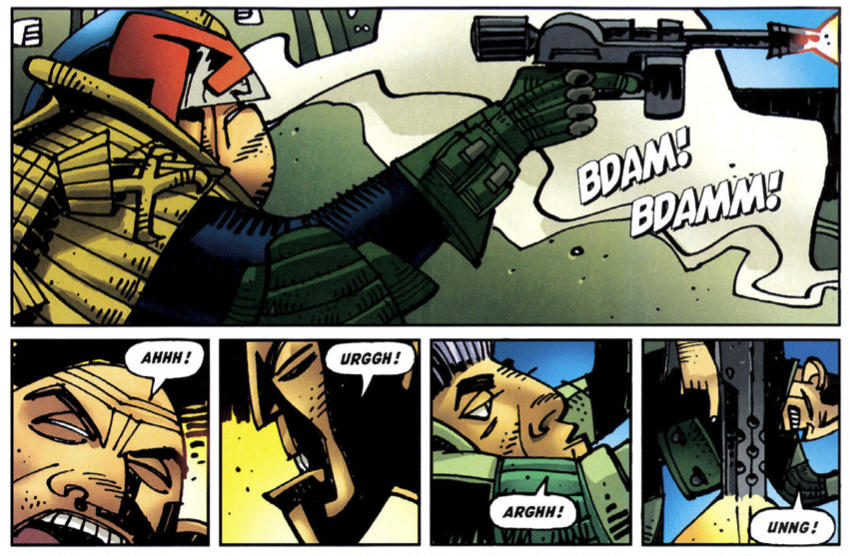
0:00:00-0:03:39: As is only customary, we introduce ourselves and the volume we’re reading this time out: Judge Dredd: The Complete Case Files Vol. 31, which collects material from 1999 and 2000, something we really didn’t make enough out of in the episode itself. They finally got to the year the comic was named for! That was a bigger deal than, honestly, it felt like in this volume — but then, we do talk about the two special strips that resulted from the big issue celebrating the fact, so maybe not.
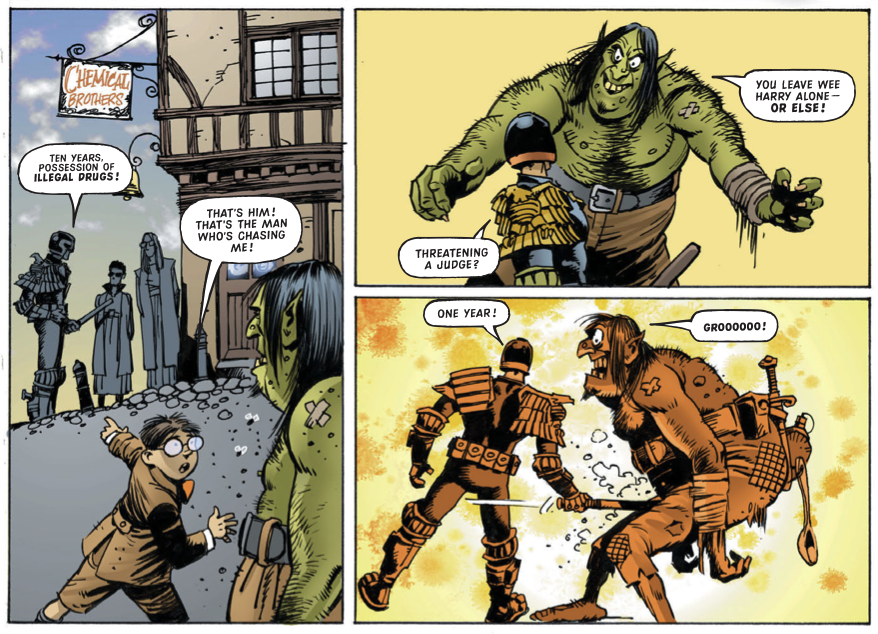
0:03:40-0:11:31: Okay, here’s the thing: this volume is extremely hit-and-miss, with a lot of the latter — in no small part due to the heavy presence of Alan Grant as writer; he’s responsible for two-thirds of the 2000 AD material in here, and it’s for the most part sloppy and obvious in a way that John Wagner’s work just isn’t. We talk about that, and the ways in which Grant disappoints far more than his former collaborator.
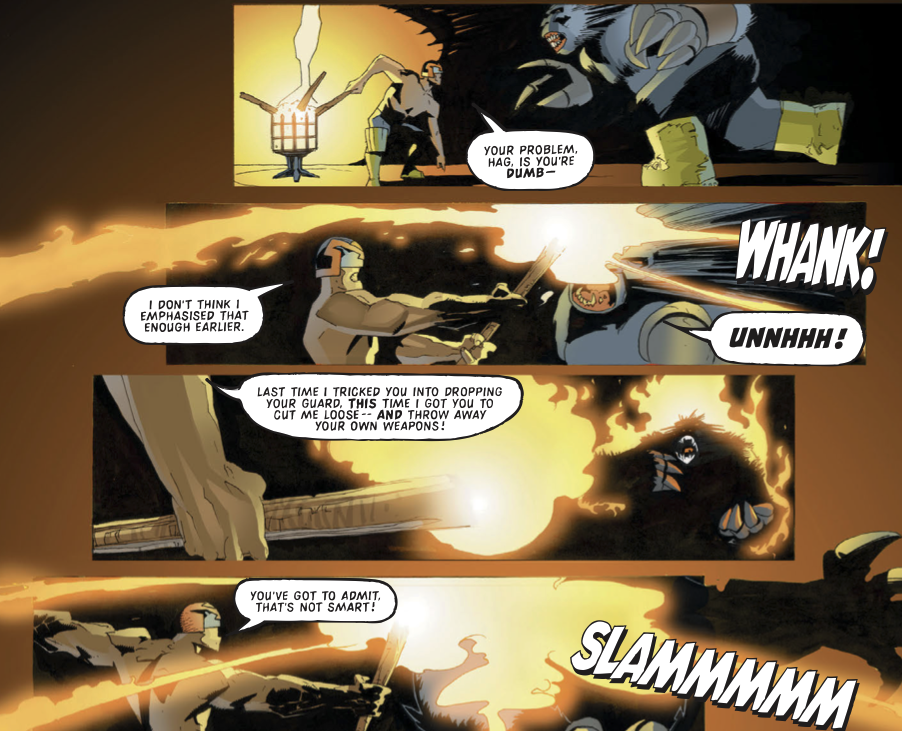
0:11:32-0:29:12: Our joined Grant rant is interrupted by what might be my primary opposition to this volume: the failure on multiple fronts of the visuals on this book, as personified by Siku, whose work is particularly disappointing and destructive towards the final product. I also complain about the coloring work of Chris Blythe in this volume, though, comparing it to Malibu Comics’ early computer coloring, which in retrospect might be a little unfair. (I still think that the colors aren’t serving the art well, mind you.) If it helps, we also talk about how good Steve Parkhouse and Mick McMahon are, though, and Jeff appreciates the ways in which John Wagner dips in to move the larger continuity of Dredd along in between the shorter strips.
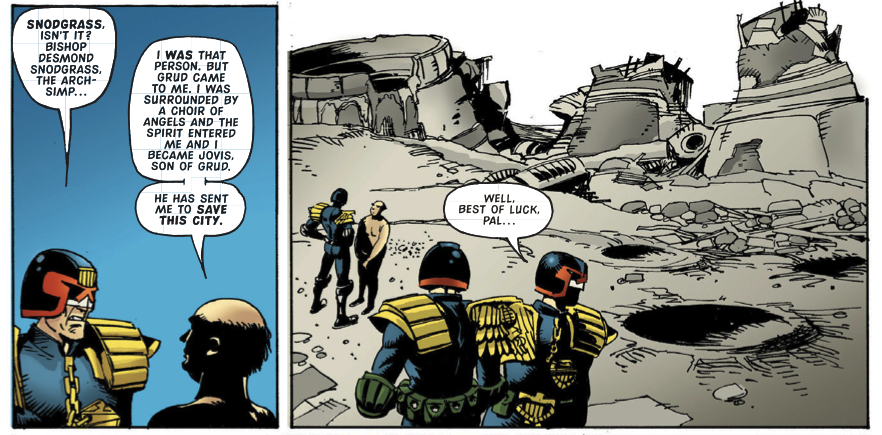
0:29:13-0:51:43: While we’re appreciating artists, we talk about the greatness that is Henry Flint, especially his work on the genuinely incredible “J.D. Megson: A Near-Death Experience,” which appears in this volume. I reveal the subtext/meta-text of the story to Jeff, and suggest that the fact that he enjoyed it without even knowing that subtext existed demonstrates that this is proof of meta-text done well. We also discuss another of the volume’s highlights, “I, Jovis” — a story that swerves away from expectations in two major ways, and is all the better for it. Also under discussion: Is there such a thing as “authentic cynicism,” or am I just talking out of my ass? (Answers on a postcard, please.) What’s the difference between “Good Dredd” and “Bad Dredd,” and do these two stories demonstrate it? And, does Dredd’s openness to the potential for religious faith in “I, Jovis” trigger Jeff’s dislike of what he’s started to call “Judge Dad” moments?
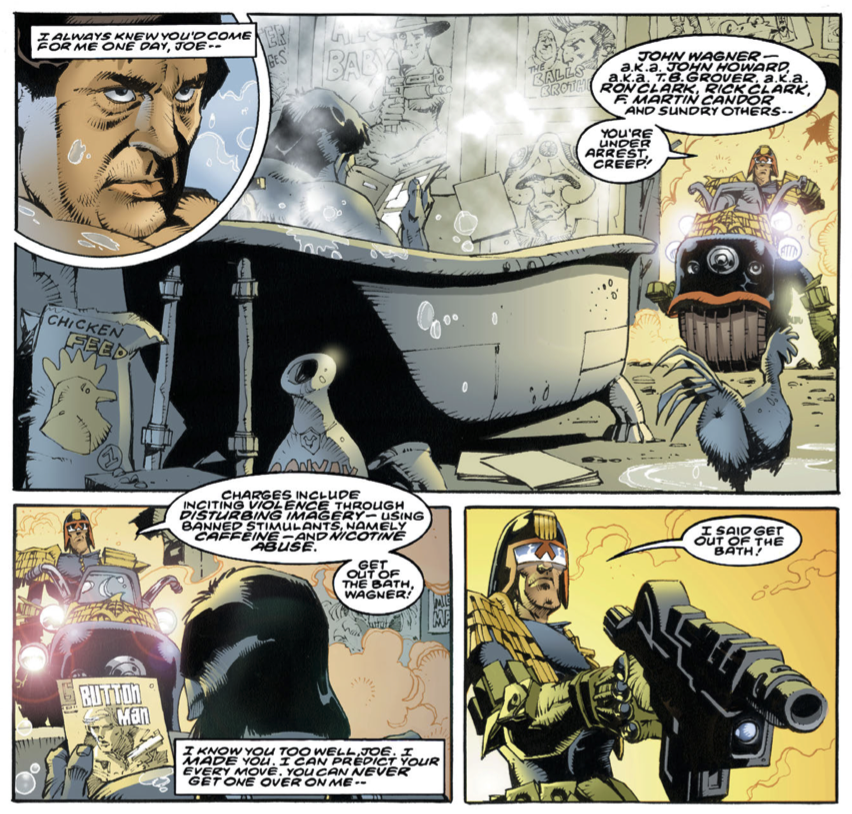
0:51:44-1:12:07: We continue singing the praises of John Wagner in a roundabout way, as we first discuss the two anniversary issue stories — “Future Crimes” and “Old Pal’s Act,” one of which is written by Wagner and one is about Wagner — as well as “Voltface,” and the way it advances the mythology of Mega-City One and the Justice Department. Hershey is now Chief Judge, but what does that mean, especially considering Wagner clearly favors Hershey as something close to Dredd’s level of honor and decency? What does it mean to be the acceptable face of something unacceptable, and is this Wagner merely planting seeds for future development, or his attempt to put the readers’ suspicion of the Judges to bed for a while? But, really, though: that flying bathtub in “Old Pal’s Act” is just amazing. We should have talked about that some more.
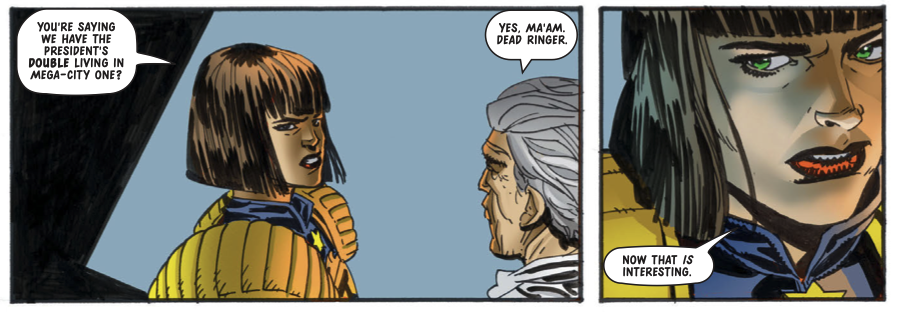
1:12:08-1:28:47: Jeff leads us briefly through the remaining Magazine stories that we hadn’t already discussed, including my refusal to give any more mental space to “Stan Lee,” the martial arts hero nonsense by Alan Grant (and, in this volume, artist Ben Willsher), before we get to “Dead Ringer,” a short-run story that manages to basically act as a tribute to and perhaps parody of “The Judge Child Quest” in miniature, written by John Wagner, who wrote the original story it’s obliquely referencing. What was going on there, and just why are some of the art choices in the story quite so bad?
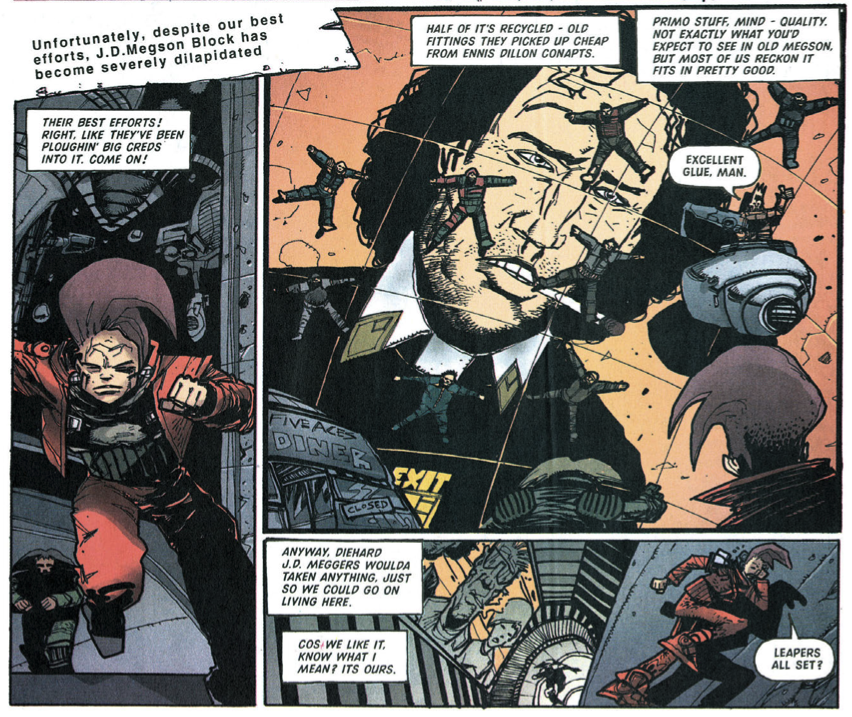
1:28:48-1:34:20: Is this volume Drokk or Dross? In a surprise decision, we both plump for Dross, because the stink of Alan Grant’s contributions couldn’t be ignored. I’d mentioned my favorite stories in this volume earlier (They’re “Volt Face,” “Future Crimes,” “Old Pal’s Act,” and “J.D. Megson,” with the latter probably being my favorite), but Jeff ultimately plumps for the equally deserving “I, Jovis,” based on the art of Steve Parkhouse as much as anything else.
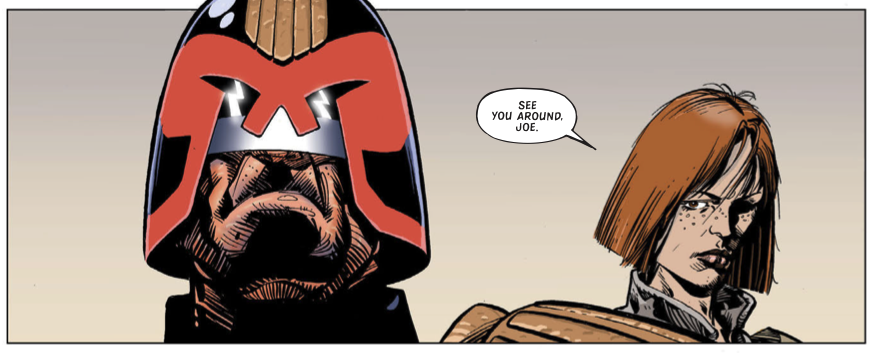
1:34:21-end: We speed towards the close of the episode by talking briefly about what’s to come — less Alan Grant! More John Smith! — and then the traditional mention of Twitter and Patreon before wrapping things up with one of Jeff’s best Dredd voices yet and my badmouthing an upcoming comics project. As always, thank you for listening and reading; we’ll be back next month with, I hope, a better volume.


So there I was, looking up the music for Netflix’s Archive 81, since I’m a sucker for anything with that much of a Philip Glass influence. Turned out that the same duo did the music for Annihilation, which made me happy. Then I saw that they did THIS. Literally my first thought: “Gotta tell Wait, What? about this one.” So here you go.
https://music.apple.com/us/album/drokk-music-inspired-by-mega-city-one/1594280639
Surprised at the lack of comment on this episode. I have not read this volume of the Case Files, but I enjoyed your discussion a lot. When Jaffa Cakes were mentioned, I did consider reminiscing about finding evidence of a Jaffa Cake heist gone wrong, but decided it was too much of a tangent even for me.
I think a lot of why there’s little comment on this episode is that our hosts were basically right about these stories — even at their best, they’re not much more than alright. It’s a weak volume, but it’s not weak in that the writing is especially bad in ways that one can easily pick apart and discuss. It’s telling quite how much our hosts discussed the art.
What this all feels like to me, is there are a lot of Judge Dredd stories here that are Judge Dredd stories, of a concept that shows that it’s been around for over two decades. There’s a feeling, for me, of a lack of any inputs beyond “this is the sort of thing that a Judge Dredd story is,” but not writing things that have anything particular to say about Britain or the world at the turn of the century. Or anything, really — our hosts noted the tendency to have parodies and gimmicks in which the point is just to do the parody or have the gimmick.
Some of that response on my part may be because at this point I had been living in the US for several years and had stopped paying much attention to Britain. But I don’t know about that — there is at least one story in the next volume that’s easy to recognize as a definite improvement, I think, and there’s something in this volume that clears the way for it in hindsight.
But only in hindsight, and this is where Wagner’s “long game” may not always be a “long game.” Sometimes it might just be Wagner spinning his wheels until he has an idea. One thing I notice about this volume is an absence. A few years earlier, it had seemed like Wagner was decisively moving in the direction of having a real supporting cast of other judges, that part of how you can find new things to do with the essentially static character of Judge Dredd is to illuminate him by showing his relationships with his colleagues. That’s been largely dropped: Castillo is nowhere to be seen; young Giant never appears; DeMarco, as Graeme McMillan mentions, vanishes forever. We have what has to be a deliberate choice to reset Dredd to a character who essentially inhabits an empty social world, who has no ties except when the story is about Justice Department politics, as with the story that puts Edgar back in the toybox.
Which is telling, perhaps, that it’s a story that disposes of an ongoing plot for the moment, putting it in limbo until there’s a use for it. Making Hershey Chief Judge also communicates that sense of trying to stop any forward motion. Because we know that Wagner is not likely to portray Hershey as an incompetent, and certainly not a malevolent, authority figure, and also that he’s unlikely to kill her off. Hershey feels like she’s probably going to be Chief Judge for a while, and that this status quo will take off the table all those stories about secretive and underhanded Justice Department actions. See also the way in which the Mechanismo robots reappear as (a) unproblematic and (b) just part of the furniture of the world.
This seems like the point is to allow Dredd to get back to the formula, to create room for a stretch of stories in which the reader has no reason to look for anything beyond, “There’s Judge Dredd, and he deals with something weird.” Wagner’s done this before, if not quite in the same way: the “A Question Of…” stories; not writing the ending to the Democracy arc. And again, I have to wonder if it’s just that the practical longtime jobbing comics writer doesn’t want to kill the goose that lays the golden eggs, that Rule No. 1 is, when you’ve got a formula that pays the bills, you may play with it a bit, but you damn well make sure not to break it.
Then again, we have John Wagner as an actual character. Like Jeff Lester, I thought that Old Pals was by Wagner himself, and it was a bit more interesting to me when I thought that. But knowing it’s by Grant doesn’t change much. It’s still a story about how Wagner fantasizes about being in control of Judge Dredd, able to do anything to him or with him, but is actually utterly powerless and incapable of affecting anything at all, trapped within the universe that he created and at its mercy. I would have predicted a bit more discussion of the story from our hosts, in fact, as this is one that I would have thought is catnip for Jeff Lester’s interest in reading comics as expressions of what it’s like to work in the comics industry.
As always, heartbreakingly great points, Voord, that I wish I’d made. Your analysis of how Hershey is putting the judge framework into stalemate and the reasons why really makes clear to me what Graeme was explaining.
And yeah, I was totally gonna go down that path for Old Pals until Graeme pointed out it was by Grant and that more or less stymied me. Because then it gets into a weirder, much more ambiguous area of trying to suss out likelihood of whether Grant is criticizing the system, criticizing Wagner for deluding himself in order to participate in it, or just flat-out cranking out pages for a check and not meaning anything about it.
Anyways, thank you again for providing a higher quality of analysis than I feel like I’m capable of providing! Always humbling and inspiring in equal measure.
I don’t know what it says about me, but Alan Grant is a scab that I love picking at. I remember an anecdote about how John Cleese and Graham Chapman worked as a writing team during their Monty Python days. Cleese would work through the structural engine of a skit, decide what the power relationship at the heart of the skit was, generally all the nuts and bolts work of sketch writing. Chapman’s contribution was to come in after the first draft was completed and say “How do we make this crazier?” Apparently Chapman was the one who said the parrot needed to be dead in the Dead Parrot skit, for instance. Looking at Wagner and Grant’s careers’ after they split make me feel like they had a similar relationship. Grant’s plot ideas without Wagner are consistently more high concept than what Wagner does on his own, but Wagner puts in more effort in writing characters and stories, including coming up with endings.
It’s interesting how much deck clearing went on in this book, though I’m not sure it’s down to Wagner not having an idea of where he wants the next long game to go. Maybe three years into Tony Blair’s government Wagner wasn’t feeling the full institutional furor, he was still just happy to have the Tories gone, so he decides to pause the big politics stories for a time so he can do some Dredd on the street work again. The next casefile should start the Brothers of the Blood sequence, which I’m not going to say anything about other than it shows Wagner starting up his next sequence of what he’s going to focus on with Dredd. It seems more likely to me that Wagner, as Voord 99 said, is putting the pause on the larger Mega City One politics stories because he’s got other things he wants to do instead, and being a long term comics writer he’s simply keeping the options of Edgar and more bad actions by Justice Department open to return to later. Graeme and Jeff have both pointed out how DeMarco never really lived up to her potential, and how dissappointing that was. Maybe he doesn’t feel like he had a good enough take on the material at the moment, so decided it needed to rest for a while until he has a new idea? Which, to bring history into this, is going to happen when he decides he just really fucking hates George W. Bush.
Thanks, Jared! Both points (about Grant and where Wagner’s at) hew pretty closely to how I feel so it’s nice to see it put so well. Cheers!
Just in some defence of Chris Blyth’s colour work – especially since he’s going to be doing his thing for some time to come – it really did look shiny and new at the time, and while the neon fades and 3D washes have aged badly, I still think they look better than US efforts at that time. Plus, there is always going to be a part of me that thinks that Judge Dredd should always look garish as hell, no matter what moody genius is providing the art, so he’s got that going for him.
Overall I agree with both of you that Case Files 31 is more dross than Drokk! These stories all appeared in my extended prog hiatus, and I’d previously only read two of the entries: JD Megson and Volte Face. However, you hooked me with the enthusiasm over I, Jovis so I bought the digital version and am glad I did.
Some guilty pleasures : Revenge of Trapper Hag; A Night with Judge Death; Lobsang Rampage (not sure why Sex Mek stories so often overdeliver, it should be an artistic dead end but they are often told with a such sympathy).
Those two curios from prog 2000 are both worth a read: Old Pal’s Act and Future Crimes.
And in amongst the rubbish there are some genuinely good stories:
The Cal Legacy wraps up the early Cal Files from two years previously, building on Edgar perfectly as well as, more surprisingly, showing Judge Roffman acting selflessly for perhaps the only time in his life.
I, Jovis was way better than it should have been and delivers that wonderful insight from Dredd that Jeff read out in full on the episode “I can’t explain the Sisters of Death…”
No Man’s Land was my first experience of the Banzai Battalion. Pure joyous fun from start to finish.
Nice to see Buggo again, and in case you are not reading the Megazine at the moment, we have just had a THIRD visit to the Om’s planet a month ago.
Thanks for this comment, Giles! Great thoughts and gave me a lot more fondness for this volume in retrospect.
Only just finished reading this Case Files last week, and finished listening to the episode today. I don’t think I’ve ever been as much in agreement with you on a Case Files in a long time. “Drossy drokk” is probably the most accurate description, and I felt Jeff’s categorization of Grant’s work (familiar but off) was fair. I didn’t hate the Grant stories outright because I like that he puts effort into showing the world of the citizens and the strange goings on in Mega-City One. I think you’ve mentioned before that the best part of the Grant-Wagner pairing was the focus on MC1 with Dredd himself being almost an afterthought. For that alone I was grateful, especially because the Ennis, Morrisson, and Millar progs all seemed to forget what a great setting MC1 is. The trauma I feel from their runs puts me in a much for favorable disposition toward Grant’s work, even if the quality wasn’t there. (I did keep flipping back to the table of contents to make sure Wagner hadn’t had a stroke when reading the Grant stories, though.) Jared’s breakdown of what Wagner and Grant each brought to the pairing feels pretty on the money to me. Do they every pair up again at any point? Would be interesting to see.
A few random thoughts.
-I think this book sealed for me that I don’t really like 2000 A.D. weekly 8-page stories. There’s not enough meat there, unless done really right, like in the first 10 volumes of Dredd. I need at least one mega-prog story each volume, or else it all feels so ephemeral. Considering the early years gave us The Cursed Earth Saga, Judge Cal, and Apocalypse War almost out of the gate, maybe I was spoiled by that. It’s not that I dislike having a bunch of 8-page one-offs in a volume., but I like having them as a side to the main dish of a good multi-part story.
-Related, although perhaps tangentially, is another realization I had. Why is the first story in the Case Files always one of the worst if not the worst? I know the creators and editors weren’t planning that when they made the stories originally, but it’s an impression I get, although I don’t know how accurate that is.
-Volt Face might have been my second favorite story, until Graeme explanation of the meta commentary pushed J.D. Megason above it. I love the one interaction with Dredd and Hershey:
Dredd: “You’ve come a long way since the first time we met.”
Hershey: “Just a kid then. Full of hopes, full of ideals… You learn.”
That was a pretty dark exchange, but felt so classic Wagner.
-It finally hit me that the judges are not just the police, but also the government and army. It’s always weird to be reminded of that when they express concerns for the economy and their funding. Not sure where to take that thought, but I’d like to see more of an exploration of it, just not in another Dead Ringer story.
-I, Jovis might have been my favorite, but the way Dredd ends that speech hit wrong for me. Dredd is a brutal fascist, but he’s not a sadist. He doesn’t kill unless he has to, unless Millar is writing him, but Millar doesn’t get Dredd. Instead of “getting on with the business of breaking heads,” Dredd should have ended it with, “getting on with the business of upholding the law,” or something to that effect
-Can Stan Lee just never, ever show up again? Surely the editors know he’s not a great character, even before you get to the problematic stuff?